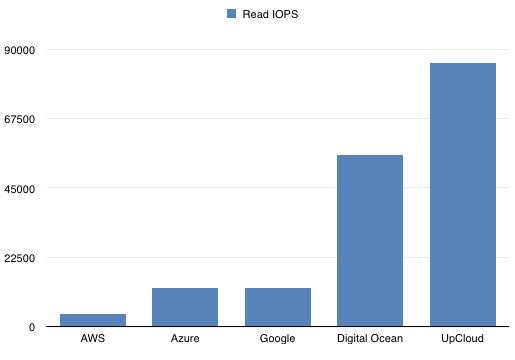In this article, we compare AWS cloud server pricing with Google and UpCloud.
UpCloud lowered its prices in London dramatically earlier this month and we wanted to take the opportunity to highlight how competitive those prices actually are. Both Google and Amazon Web Services announced price reductions this week in an attempt to maintain their image of price leadership.
UpCloud vs AWS cloud server pricing
In the tables below, we have compared UpCloud’s pricing to first Amazon Web Services (AWS) and then to Google. For clarity’s sake, we have omitted the instance specifications from the table, but you can dive into those on Amazon’s website or on Google’s Cloud Engine website. UpCloud can match configurations from both companies as our customers are able to freely define their server resources.
Amazon Web Services
General purpose (Current Generation with SSD storage), Ireland
| Instance | €/30 days (AWS) | €/30 days (UC) | UpCloud’s advantage, € |
| m3.medium | 40.22 | 22.70* | 17.52 |
| m3.large | 80.44 | 47.80 | 32.64 |
| m3.xlarge | 160.89 | 90.80 | 70.09 |
| m3.2xlarge | 321.77 | 181.60 | 140.17 |
* UpCloud’s Instance with 10GB of SSD, AWS with 4GB.
You can clearly see that especially with regards to the high-performance servers, UpCloud’s price advantage is clear. We really do stand behind our words in offering high performance, redundant, cloud computing at a very attractive price. It is always worth diving deeper into the prices instead of comparing the smaller configurations available, as Amazon Web Services and Google really seem to price their larger instances at higher premiums.
Amazon Web Services
General purpose (Previous Generation with HDD storage), Ireland
| Instance | €/30 days (AWS) | €/30 days (UC) | UpCloud’s advantage, € |
| m1.small | 24.55 | 23.48 | 1.07 |
| m1.medium | 49.62 | 43.36 | 6.26 |
| m1.large | 99.25 | 85.56 | 13.69 |
| m1.xlarge | 197.97 | 168.96 | 29.01 |
When compared with HDD storage, UpCloud’s advantage isn’t as high as in comparing servers with SSD storage. However, it has to be remembered that with UpCloud, your data is more securely stored. Amazon Web Services outlines for example that your data is lost for good if the drive attached fails, or you stop the EBS backed instance or terminate it. We believe no customer should risk their data with such technology.
At UpCloud your data is always stored on two separate storage backends which are constantly synchronised. Therefore if your server experiences a drive failure, an automatic failover takes place and your server continues to serve content happily. Oh, and these storage backends are further RAID-secured to add another layer of redundancy.
Google Cloud Platform – Compute Engine,
Standard Instance types
| Instance | €/30 days (Google) | €/30 days (UC) | UpCloud’s advantage, € |
| n1-standard-1 | 40.22 | 23.36 | 16.86 |
| n1-standard-2 | 80.44 | 44.06 | 36.38 |
| n1-standard-4 | 160.89 | 85.46 | 75.43 |
| n1-standard-8 | 321.77 | 168.26 | 153.51 |
| n1-standard-16 | 643.55 | 333.86 | 309.69 |
Note: All UpCloud instances include at least 10GB of HDD storage. Google’s instances do not include storage. Google’s pricing does not include sustained use discounts.
Google comes into the game with slightly larger instances at the top end, however, the price advantage for UpCloud is clear. At the high end, you can have double the capacity at UpCloud what you can have at Google.
It is true that both Google and Amazon Web Services offer reduced prices for those who commit to longer terms. We believe this is a dramatic step back from one of the core benefits of using cloud computing – flexibility. You should be able to run your servers for a matter of a few hours or a month and be always sure that you get an attractive price, without having to jump through hoops to achieve those prices. At UpCloud, we only have one price and you always pay for what you use.
Try UpCloud for free!
We offer a 72 hour Free Trial to help you to speed up your WordPress or eCommerce! Fastest cloud servers with 2x the performance as the competition & 100% uptime SLA. Deploy in seconds, pay less. Get started now! Free trials available here
In case you would like to learn more about some specific detail of the infrastructure described here, don’t hesitate to contact UpCloud at our sales ([email protected]).
Notes on calculations:
All prices are in euros and calculated with a conversion rate of 1 USD=0.7255 euro. The comparison was done on the 27th of March, 2014. UpCloud’s server prices include CPU, memory, storage and IP-address pricing. 30 days equal to 720 hours of runtime.

